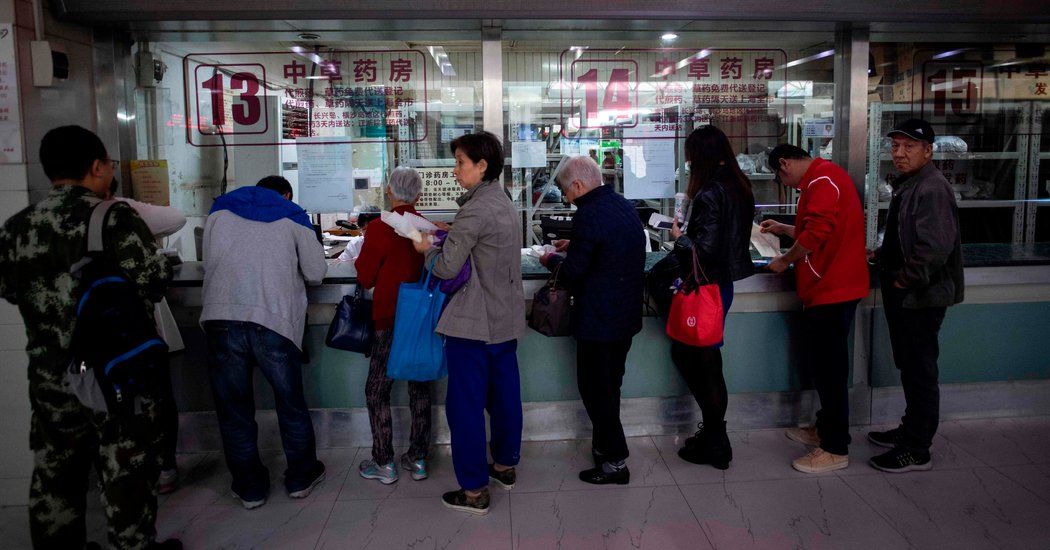
BEIJING — China said it would reduce the penalties for the sale and import of unapproved drugs, effectively giving poor and critically ill patients the green light to get cheaper generic pharmaceuticals from other countries.
The move, announced on Monday, could help fill a gaping hole in the country’s overburdened health care system. For years, Chinese patients and their relatives risked the threat of heavy criminal penalties in their hunt for affordable drugs in a country increasingly suffering from chronic diseases like cancer.
In the most desperate of cases, relatives of these patients have resorted to making their own cancer drugs at home using raw pharmaceutical ingredients that they have found online.
The effectiveness of the new move could depend on the details. The Chinese government said the changes to the current law will take effect on Dec. 1 but did not specify how penalties would be reduced.
Chinese law currently holds that drugs not approved by the National Medical Products Administration are “fake,” and companies and individuals caught selling such drugs could be fined up to five times their value as well as criminally charged.
Selling these drugs may result in a jail sentence of up to three years, even if there are no serious consequences, according to the state-backed China Daily newspaper. Harsher penalties may apply in more serious cases, it said.
[How sick people in China break the law to get lifesaving drugs, as Beijing struggles to provide a safety net for more than one billion people.]
Chinese state media said the changes could allow more people to obtain generic drugs from countries such as India without waiting for the approval of official regulators. In China, such drugs are currently bought through “daigous,” or black-market purchasing agents.
“This new move is significant because it redefines ‘fake or counterfeit drugs’ by focusing on their safety and efficacy, not on whether they obtain government approval,” said Yanzhong Huang, a senior fellow for global health on the Council on Foreign Relations, in an email.
“Under the new definition, a cheaper generic drug made in India can be imported and sold in China,” Dr. Huang wrote. “Given that these drugs are usually much cheaper than the prohibitively priced Western patented drugs, a significantly larger percentage of Chinese people can now afford those lifesaving drugs.”
According to Dr. Huang, the Indian version of the lung-cancer drug Iressa cost $10 a day in 2016, compared with $100 a day for the patented drug in China. He said generic drugs cost, on average, 97 percent less than patented drugs sold in China.
The lack of access to drugs has taken on more urgency as the Chinese government grapples with the mounting health problems of its 1.4 billion people. Heart disease, strokes, diabetes and chronic lung disease account for 80 percent of deaths in China, according to a World Bank report in 2011.
Cancer diagnoses in China are soaring, and survival rates are low. About 4.3 million cancer cases were diagnosed in 2015, or almost 12,000 a day. That was nearly double the rate five years before, according to official figures.
In China, the public has long expressed frustration with its lack of access to effective drugs to treat those kinds of diseases. A 2018 film, “Dying to Survive,” was based on the real-life story of a Chinese leukemia patient who smuggled generic drugs from India to save himself and others. A box office hit, it was almost universally lauded for shedding light on the difficulties of getting cancer drugs in China. The movie’s popularity prompted Premier Li Keqiang to call for speeding up price cuts for the medication.
Even the rich in China contend that red tape and stringent regulatory rules prevent them from getting access to new drugs that are approved in the United States, and many say they are forced to fly overseas for treatment.
Yuan Jie, a senior official with the Standing Committee of the National People’s Congress, a top group of Chinese lawmakers, said the decision to redefine the scope of counterfeit drugs was “a response to the concerns of the people,” according to an official transcript.
In a statement, the National Medical Products Administration said the government would reduce punishment for the distribution of such drugs. If no harm is caused or no treatment is delayed, the parties can be exempt from punishment. And if the circumstances are deemed to be “relatively minor,” the parties involved will face “lighter penalties” if they are importing a “small amount” of drugs.
Drug approvals, while accelerating, remain dauntingly backlogged in China. Until October 2017, pharmaceuticals approved in the United States and Europe had to go through an extensive vetting process in China.
Chen Xi, an assistant professor of health policy and economics at the Yale School of Public Health, said in an email that while China had more than tripled the number of people evaluating new drug applications, “it is still far from meeting the rising and diversifying demand.”
Experts said they remained concerned about the enforcement of the law and that vague terms such as “light penalties” and the lack of a definition of “small amount of unapproved drugs” gave the government a lot of leeway to interpret them strictly.
Dr. Chen said a more significant step would be to continue improving the efficiency of drug approvals in China and reducing drug prices to meet the demand.

